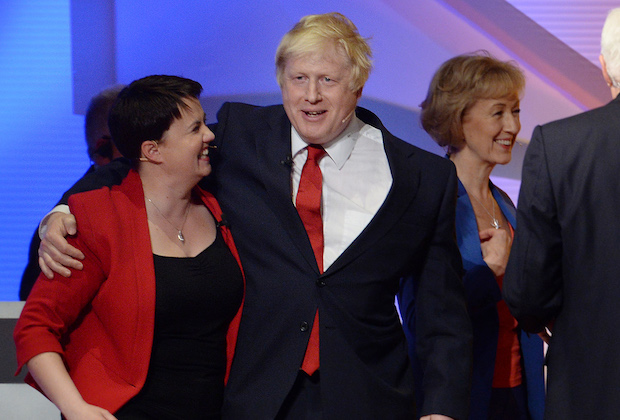Boris Johnson and Ruth Davidson are two of my favourite Tory politicians: both energetic, eloquent, optimistic, pro-immigration and – in general – liberal conservatives. Both have proven track records of winnng voters in parts of the country that had been inhospitable to Tories. Both are advocates of conservatism for explicitly progressive reasons: but because it’s the best way of helping those who need help most.
So I’ve never worked out why there seems to be a firth of bad blood between them. We saw it in the Brexit campaign: it seemed, as times, that the main reason Ruth joined the Wembley Brexit debate was the joy of giving Boris a kicking. The front page of today’s Times has her doing it again, rebuking him over the (tendentious-but-legitimate) use of £350 million-a-week figure for UK contributions to the EU. The headline, about her slapping him down, will make many a conservative sigh and ask: do these Tories have to fight each other? Don’t they realise it’s time to team up, and fight the other side?
Reading the full interview with Ruth Davidson, it’s clear that she didn’t set out to attack Boris. I suspect she probably spent an hour resisting anti-Boris questions being dangled in front of her. She was (and remains) a passionate Remainer, so if she’s asked about the Leave attack lines, especially the £350 million, then she’ll give a straight response. Too much optimism over Brexit is a bad thing, she says. Too much of anything is a bad thing, of course, but there are no prizes for guessing who he had in mind.
She also says in her interview that she was against Brexit partly because she thought it would give new energy to the SNP: polls since then might have alleviated her concern on that front. And her question to Boris in Wembley – “how many jobs, Boris?” – has also been answered: quarter of a million more jobs created since the referendum, as opposed to the drop of 500,000 jobs suggested by the Treasury. Reason, perhaps, for her to be less pessimistic about Brexit than she was.
But this is politics, and folk tend not to change their minds much. Tories are perhaps the worst for cliques and feuds that never die. As a general rule, the older the Tory the more reasons they’ll have to hate the other Tories. The problem this time is that, as Iain Martin observed recently, this feuding is happening at a time when there happens to be an army of well-organised Marxists on the march, offering to nationalise the utilities at a time when voters back this by a ratio of 3:1 – as the Legatum Institute research showed yesterday, half of voters would even nationalise the banks. There’s more support for tax-and-spend than there once was, so the ground is shifting a little. But the truth is that Britain is neither a left- nor a right-wing country, elections are usually won by the team that looks marginally more competent. At the moment, the Conservatives are doing their best to look like a disgraceful shambles.
So I wonder: against such a backdrop, might Ruth and Boris make up? Perhaps focus on promoting progressive Conservatism, building on the (many) achievements of the coalition years? Ruth’s distinct version of Toryism did very well at the last election. Many MPs would enlist her as Tory leader tomorrow, if she was interested – but she’s not. And down south, the closest adherent to her brand of Toryism is the former Mayor of London.
In my view, it’s already over for Boris. He spectacularly botched his chance to be leader last year. He’s too unpopular amongst MPs, I suspect, to stand a chance again. But this doesn’t render him entirely useless as a politician – he still has a huge popular appeal. As Boris puts it, the referendum brought him more working-class support and more upper-class enemies so a higher class of abuse
Perhaps I’m biased, as someone who now sits behind his old desk, but I don’t see him as an amoral schemer whose only aim in life is to get into No10. The Brexit wars meant a lot of people whom he defeated will hate him, all the more so because they regard him as an idiot and can’t see how an idiot could have won.
In general, the Remain vs Brexit tension persists in the Tory party – but is morphing into feuds. If this continues, the victor will be Corbyn. If Ruth can be persuaded of that too, might she drop her opposition to Boris and focus instead on promoting her brand – dare I say, their brand – of Conservatism?
Reagan used to say that it’s amazing what you can achieve in politics if you forget about who gets the credit. I suspect the Conservatives would be amazed what they could achieve if they forget about their feuds. But perhaps it’s too late for that. Next week would be a good time to start.







Comments